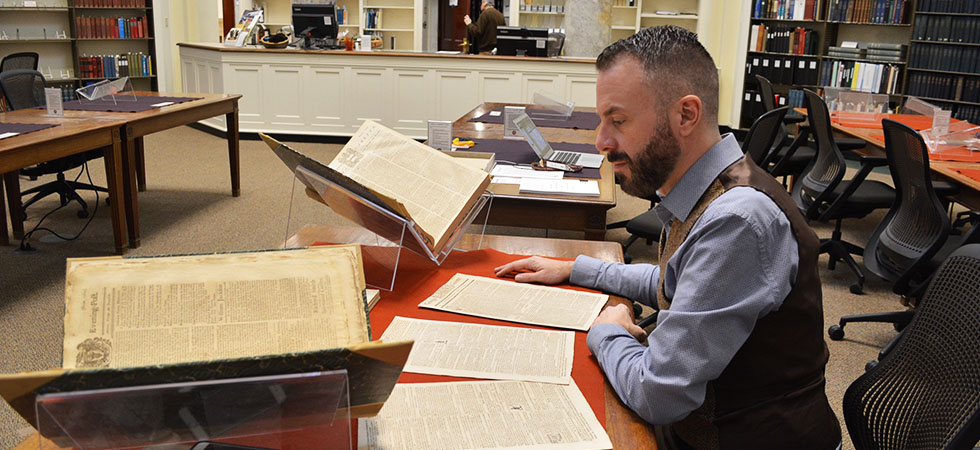March Madness as Adverts 250 Project Nets Second Place in National Championship

While much of the country is fixated on this weekend’s NCAA Final Four, Assumption’s Associate Professor of History Carl Robert Keyes, Ph.D., is celebrating a Final Four victory of his own—his Adverts 250 Project finished second overall in The Junto: A Group Blog on Early American History’s annual March Madness tournament.
The Adverts 250 Project is a daily research blog that examines newspaper advertisements from eighteenth-century America. Each day, Prof. Keyes analyzes those print ads, providing information on marketing strategies from the period or how such ads provide a glimpse into daily life at the time. During the academic year, he invites students in his Colonial America, Revolutionary America, and Public History courses to serve as guest curators who select the ads and provide their own analysis. Prof. Keyes supplements their work with “additional commentary” that further places each ad in historical context.
“This is always very exciting for the students, even in past semesters when the project was not part of a tournament,” Prof. Keyes explains. “My students are junior colleagues who do serious archival research, write and revise their entries, engage with audiences beyond the classroom once their work is published, and grow their digital footprints with high-quality content that they have created in collaboration with a faculty mentor.”
Each year The Junto hosts a March Madness tournament with a different theme. This year’s theme was digital projects on early America and included the 64 most prominent and influential projects of this kind in the country. As the fifth seed in the “Blogs and Online Publications” bracket, the Adverts 250 Project had formidable matchups against projects from universities, major research libraries, state historical societies, and other institutions with significant resources devoted to their digital humanities projects. Despite its competition, the Adverts 250 Project cruised through its bracket, won its Final Four matchup, and made it to the final round, falling just short (52 percent to 48 percent of votes) to second-seeded Harvard’s Colonial North America project.
“I consider the Adverts 250 Project’s inclusion among the 64 digital projects related to early American history an important recognition of its significance in the field,” said Prof. Keyes. “It is grueling to research, write, and publish new content every day of the year, but this has been a great way to share my research with broader audiences. The tournament increased the visibility for the project, which means that even more people will have a chance to learn about politics, commerce, and everyday life from newspaper advertisements published on the eve of the American Revolution.”
When it announced the results, The Junto said this year’s final matchup “attracted far more votes than any of the other matches in the tournament, reflecting both projects’ impressive ability to engage with a broad community of creators, users, and readers.”
In addition to the Adverts 250 Project, Assumption was represented in a second way: the bracket for “Newspapers and Ephemera” includes fourth seed Isaiah Thomas Broadside Ballads Project sponsored by the American Antiquarian Society (AAS). Students in the History Department’s Revolutionary America and Public History courses contributed to this project, using T-PEN software to transcribe broadside ballads published during the War of 1812 as well as insert metadata coding according to TEI (Text Encoding Initiative) standards. This collaboration as a Community Service Learning project helped to launch the transcription and coding stage of the Isaiah Thomas Broadside Ballads Project. It also led to Andrew Lampi ’16 being hired by the AAS to complete transcription and coding of ballads not included in the classroom project.
The Junto, named for the reading and discussion group established by Ben Franklin, is operated by early-career historians of early America. Since its founding in December 2012, it has been one of the most influential online clearinghouses for all things related to early American history.
